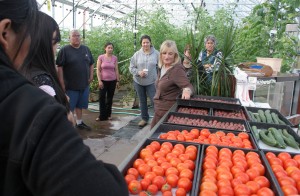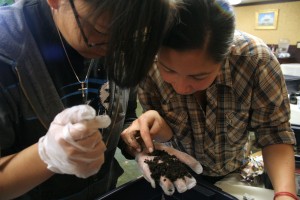Rural residents attend growers’ school in Fairbanks
August 22, 2011

907-474-5406
8/22/11
Donavan Kienenberger picked up a blue, three-gallon plastic tub and turned to his students, “OK guys. Let’s do worms.”
The 11 participants in this year’s Alaskan Growers School gathered around Kienenberger for their class last week on composting with worms. Each participant used an electric drill to puncture ventilation holes in a tub and added torn newspaper, handfuls of soil and around 10 small red worms — the ingredients of a composting factory.
The students, who hail from Ketchikan to Fort Yukon, are attending the two-week Alaskan Growers School in Fairbanks through Friday. The University of Alaska Fairbanks Cooperative Extension Service coordinates the school, which aims to teach Alaska Natives skills to grow enough food for themselves and 10 other families. The school is funded by a three-year grant from the U.S. Department of Agriculture Beginning Farmer and Rancher Development Program.
Project director Heidi Rader, tribes Extension educator at Tanana Chiefs Conference, said she hopes the school will help Alaska Natives in rural communities grow food to complement subsistence activities. “The goal is to introduce people to a variety of skills and maybe even start a business,” she said.
Last week, participants attended classroom sessions taught by Extension agents, representatives of state and federal agencies, and local experts. Topics ranged from gardening and farm topics, to beekeeping, raising chickens, marketing and starting a small business. This week, they are getting practical experience at Calypso Farm and Ecology Center and camping on the grounds. During the practicum, they will see how the farm operates and will milk goats, harvest vegetables and build a compost pile and a hoop house.

Dale Gimple of Nikolai said he hopes to buy less from the village store, where 10-pound bags of potatoes cost more than $20. He also hopes to provide for a large extended family.
Diane John of Tetlin gardened for the first time last year and raised enough to share with family members and elders. She doubled her garden space this year. She has two raised beds, a greenhouse and a potato patch. She’s learned a lot about gardening from the school, including how to build a better greenhouse and test her soil.
“I like it and think it will help me do better,” she said.
In addition to the in-person school in Fairbanks, Kienenberger and Rader offered a beginning growers’ school this spring through various distance delivery methods. More than 40 participants from 26 Alaska communities participated in the series of 10 lessons, which were offered by correspondence, teleconference and two online methods. Kienenberger and Rader will evaluate which method works best for rural residents.
Rader expects to offer an advanced class this fall by distance delivery and more classes next year, once the effectiveness of the distance delivery methods is evaluated.
Applicants for the advanced school must have completed the beginner’s school or the online Alaska Master Gardener program. For more information, contact Rader at 907-452-8251, ext. 3477 or Kienenberger at 907-452-8251, ext. 3447. More information about the program is located at www.uaf.edu/ces/ags.
ADDITIONAL CONTACTS: Heidi Rader, Extension tribes educator, at 452-8251, ext. 3477 or via e-mail at hbrader@alaska.edu.
ON THE WEB: http://www.uaf.edu/ces/ags/
DC/08-22-11/040-12


